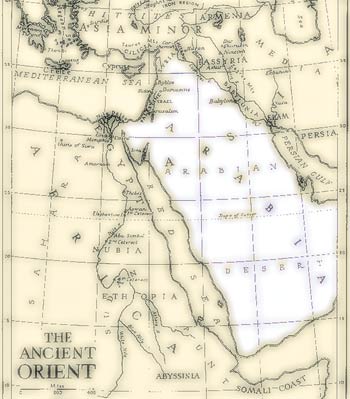The Prophet Moses (pbuh) Departs from Egypt
 |
| Map of ancient Egypt. |
In the Qur'an Allah relates the following event about the Prophet Moses' (pbuh) life:
He (Moses) entered the city at a time when its inhabitants were unaware and found two men fighting there—one from his party and the other from his enemy. The one from his party asked for his support against the other from his enemy. So Moses hit him, dealing him a fatal blow. He said, "This is part of satan's handiwork. He truly is an outright and misleading enemy." (Surat al-Qasas: 15)
The above mentioned event reveals to us a situation in which the Prophet Moses (pbuh) witnessed a fight involving a man from his own party, he sided with, smiting the other. Though he did not intend to kill him, the man died from the blow. The Prophet Moses (pbuh) realized he erred. The moral of this account is that, when a person is in the wrong, it is unjust to support him simply because he is from one's own party. In the Qur'an it is related that the Prophet Moses (pbuh) referred to his wrongful action, that is, his assumption of the superiority of the man from his own party, as "the satan's handiwork."
Alerted by his conscience, the Prophet Moses (pbuh) promptly grasped that this sentiment was an evil from the influence of satan, and, accordingly, sought refuge from it in Allah and repented. In the following verses, we read of the exemplary and conscientious approach adopted by the Prophet Moses (pbuh):
Morning found him in the city, fearful and on his guard. Then suddenly the man who had sought his help the day before, shouted for help from him again. Moses said to him, "You are clearly a misguided man." (Surat al-Qasas: 18)
As is related by the verses, aware that his safety was in jeopardy, the Prophet Moses (pbuh) spent the night on guard against any possible harm from Pharaoh and his people. The next day, the event related in the above verse took place; the man who asked the Prophet Moses' (pbuh) help the previous day came to him with a similar demand, this time against another man. The man hoped to receive Prophet Moses' (pbuh) help yet another time, based on the fact that he was from his own people. However, the Prophet Moses (pbuh) avoided repeating the same error. Aware that his companion was not in the right, he refused to help him. Immeadiately turning against the Prophet Moses (pbuh), this person who was the actual criminal, displayed his great depravity:
In any case, though committed unintentionally, the Prophet Moses (pbuh) was considered a person who killed an Egyptian. Meanwhile, Pharaoh and the leading followers discussed the Prophet Moses' (pbuh) punishment, even the possibility of executing him. Someone who overheard the discussion came to warn the Prophet Moses (pbuh). Upon this warning, the Prophet Moses (pbuh) left Egypt:
These facts about the life of the Prophet Moses (pbuh) give us some insight into his superior morality and beautiful personality as well. It appears that he was rather an excitable man. After Allah's discourse with him, the Prophet Moses (pbuh) displayed an examplary morality that feared only from Allah, sought refuge only in Him and put his trust in Him. This is a very good example of how Allah strengthens one's character.
- Introduction
- Sovereignty of Pharaoh in Egypt and the Condition of the Children of Israel
- Birth of the Prophet Moses (pbuh)
- The Prophet Moses (pbuh) Departs from Egypt
- Entrance Into the Country of Midian and His Settlement There
- Arrival at the Valley of Tuwa and the First Revelation
- Allah's Discourse with the Prophet Moses (pbuh)
- The Prophet Moses (pbuh) Requests the Prophet Aaron (pbuh) as a Companion
- The Story of the Prophet Moses (pbuh) and the Mystery of Destiny
- Conveying the Message to Pharaoh and the Proper Manner To Communicate It
- The Corrupted Reasoning of Pharaoh
- Signs to the End Times from the Story of the Prophet Moses (pbuh)
- Titles of Egyptian Rulers in the Qur'an
- The Struggle of the Prophet Moses (pbuh) Against the Magicians
- The Prophet Moses (pbuh) Demolished the Idol of His Time
- Some of Pharaoh's Court Embrace Faith
- A Man of Faith in the Palace
- Depravity in Some of the People Among the Children of Israel
- The Period of Disasters and the Folly of Pharaoh
- Exodus from Egypt and the Drowning of Pharaoh in the Sea
- The Arrogance of Karun and His Punishment
- Some Members of the Tribe of the Prophet Moses (pbuh) Stray and Worship the Golden Calf
- Perverse Conduct of Some of the People Among the Children of Israel
- The Prophet Moses (pbuh) and a Learned Man
- Conclusion
